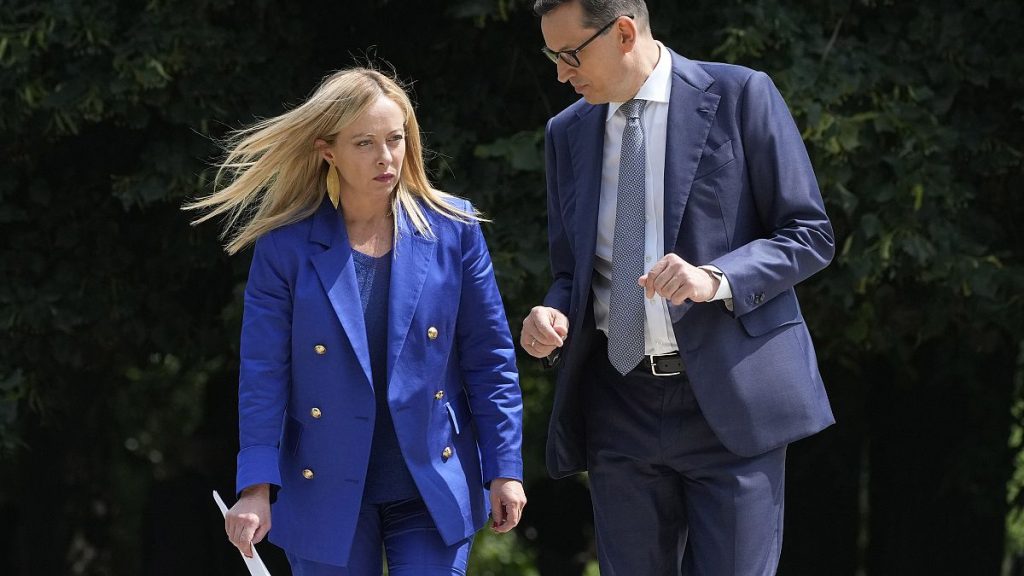Mateusz Morawiecki, the incoming president of the European Conservatives and Reformists (ECR) group in the European Parliament, has invoked the imagery of J.R.R. Tolkien’s “Lord of the Rings” to describe contemporary political challenges. During a meeting with Italian Prime Minister Georgia Meloni, he gifted her a copy of Tolkien’s book inscribed with a call to “fight the evil together” and “defeat Mordor.” This symbolic gesture, reminiscent of a similar statement made during a previous meeting, prompted inquiries into Morawiecki’s real-world interpretation of the fictional evil empire.
In an interview with Euronews, Morawiecki elaborated on his metaphorical use of “Mordor.” He identified present-day Russia under President Vladimir Putin as a primary embodiment of this malevolent force. He underscored the destructive nature of Putin’s regime, highlighting its actions as antithetical to the principles of sovereignty and international cooperation. However, Morawiecki’s definition of “Mordor” extended beyond the geopolitical realm, encompassing forces within the European Union that he perceives as undermining member states’ autonomy. He criticized those advocating for greater centralized power within the EU, suggesting that while not entirely analogous to “Mordor,” these forces represent a counterproductive influence on the bloc’s trajectory.
Morawiecki’s “Mordor” metaphor highlights his broader political concerns, particularly regarding the balance of power within the EU. He expressed opposition to a European Parliament proposal that would enhance the EU’s authority over national governments, viewing it as a threat to the sovereignty of member states. This stance reflects his commitment to a more decentralized EU structure, where individual nations retain greater control over their own affairs. His invocation of “Mordor” serves as a rhetorical device to underscore the perceived dangers of excessive centralization and the potential erosion of national sovereignty.
Beyond his concerns about internal EU dynamics, Morawiecki also addressed the political landscape within Poland. He acknowledged the deep partisan divisions plaguing the country, particularly between his own Law and Justice party and the opposing Civic Platform, led by former Prime Minister Donald Tusk. Despite these stark differences, Morawiecki expressed a willingness to cooperate even with his political adversaries for the benefit of Poland and the EU. He contrasted his own purported openness to collaboration with what he characterized as the current government’s reluctance to engage constructively in addressing European challenges. This assertion reflects the ongoing political tensions within Poland and the deep divisions between the ruling and opposition parties.
Morawiecki’s comments also touch upon the shifting alliances within the European Parliament. He highlighted the emergence of a new coalition comprising the European People’s Party (EPP), the ECR, and the Patriots for Europe, capable of influencing decision-making on significant issues. This coalition, distinct from the one that supported the current European Commission, underscores the evolving political dynamics within the EU parliament and the potential for new alliances to shape the bloc’s future. Morawiecki’s emphasis on this shifting landscape suggests a potential realignment of political forces within the EU and the possibility of new power dynamics emerging.
Finally, Morawiecki criticized the agenda of Poland’s upcoming presidency of the Council of the EU, which will be overseen by Donald Tusk. This criticism reflects the ongoing political rivalry between Morawiecki and Tusk and underscores the deep divisions within Polish politics. By framing Tusk’s agenda as detrimental to the EU, Morawiecki seeks to delegitimize his political opponent and position himself as a defender of the bloc’s interests. This preemptive criticism of the upcoming Polish presidency highlights the ongoing political maneuvering within the EU and the potential for domestic political rivalries to spill over into the European arena. Overall, Morawiecki’s statements provide a glimpse into his political worldview, his concerns about the future of the EU, and the complex political landscape both within Poland and across the broader European stage. His use of the “Mordor” metaphor, while seemingly dramatic, serves as a rhetorical device to highlight his anxieties about perceived threats to national sovereignty and the need for a more balanced distribution of power within the EU.














